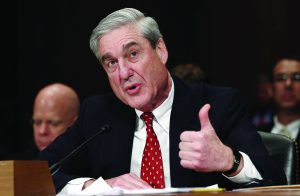Former FBI Director Appointed to Investigate Trump Campaign

After President Trump fired FBI Director James Comey last week, the Justice Department appointed another former FBI Director to lead the investigation into allegations of Russia’s interference with last year’s presidential campaign, and whether any of Trump’s campaign operatives colluded with the Russians.
Robert “Bob” Mueller, who served as Director of the FBI under President George W. Bush and for five years of President Barack Obama’s tenure, was selected this week by Deputy Attorney General Rod Rosenstein to head up special investigation into the Russian matter.
Mueller served as Director of the FBI for 12 years and was replaced by James Comey. Comey was fired by President Trump last week.
“The public interest requires me to place this investigation under the authority of a person who exercises a degree of independence from the normal chain of command,” Rosenstein wrote in a statement announcing the appointment.
As special counsel, Mueller will have the authority to investigate the Russian scandal and prosecute crimes uncovered in the investigation.
Before being appointed by Bush as FBI Director, Mueller served three years as US Attorney in San Francisco. He was appointed to that position by President Bill Clinton.
When Mueller reached his 10-year maximum time as FBI Director, President Obama waived the limit in order for Mueller to stay on the job. He is the only FBI Director since J. Edgar Hoover to serve for more than the 10-year limit imposed by Congress in 1968.
Mueller was praised this week by leaders of both parties for his non-partisan approach, hard-working style, and integrity.
“No better person who could be asked to perform this function,” California Senator Dianne Feinstein said. Feinstin has known and worked with Mueller for over 20 years. “He is respected, he is talented and he has the knowledge and ability to do the right thing.”
Republicans expressed similar support for Mueller’s appointment.
“It’s impossible to think about Washington without politics blowing people off course,” said John Ashcroft, who served as Attorney General under George W. Bush. “But if anyone can stay on course and not be deterred by the whims of politics, it’s Bob Mueller.”
The scope of the investigation may also be expanding. Separate investigations by the House and Senate Intelligence Committees have focused on evidence of Russia operatives’ attempts to influence the outcome of the 2016 presidential election.
The investigations have also looked into meetings and conversations between Trump campaign operatives, including General Michael Flynn, and Russian operatives.
In recent days, given the firing of FBI Director James Comey, and allegations that President Trump asked Comey to drop the investigation into Flynn, the scope of Mueller’s investigation may include all of the connections between Trump’s circle of advisors, including Flynn, Trump’s son-in-law Jared Kushner, and others.
Mueller’s appointment states that he can also investigate other matters that “may arise directly from the investigation.
Deputy Attorney General Rod Rosenstein made the appointment because Attorney General Jeff Sessions has recused himself from the Russian investigation because he too had conversations with the Russian Ambassador, Sergey Kislyak, twice during the campaign.
Sessions, then a US Senator, was the first sitting Senator to endorse Donald Trump and served as an advisor to the candidate. During his confirmation hearing for appointment as Attorney General, Sessions denied having met with Russians, but his meetings were later revealed.
Sergey Kislyak is at the center of the Russian investigation because it was with him that General Michael Flynn secretly talked about removing sanctions against Russian that President Obama had put in place. Flynn’s failure to disclose those calls led to his firing as Trump’s National Security Advisor.
This Thursday, Rosenstein testified behind closed doors before a Senate committee, and refused to give details of Comey’s firing, including his role in drafting a recommendation to President Trump to fire Comey.
After the hearing, Senators seemed to grasp the seriousness of the investigation.
“As it became clear how little he was willing to talk about, it also became clear how broad this investigation that Mueller is about to undertake actually is,” Senator Chris Murphy of Connecticut told reporters after the hearing.





